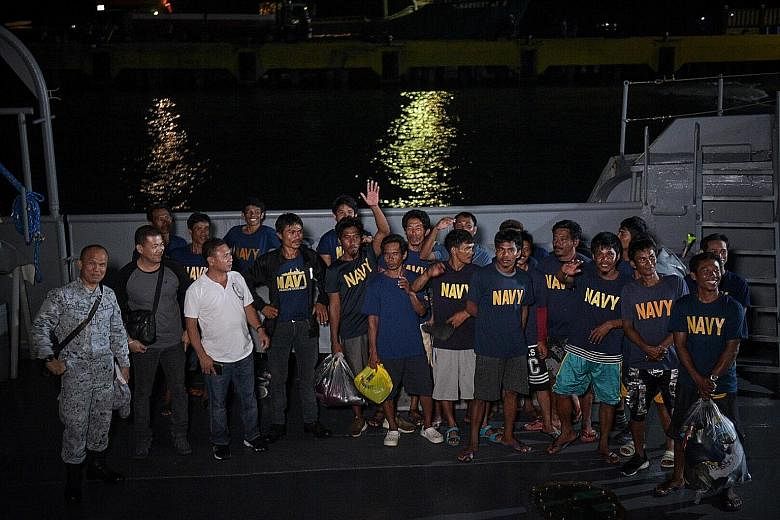It was midnight on June 9. Mr Junel Insigne had claimed his small corner on the 14-tonne, wooden outrigger boat that had taken him and his crew of 21 fishermen more than 150km from their seaside town in Occidental Mindoro province in the Philippines.
As he began to doze off, he heard the men yelling. A bigger vessel was bearing down on them. He stood up and tried to start his boat's engine but it was too late.
There was a loud crash. His boat, the Gem-Vir, was wrenched from its moorings. It spun violently and was dragged briefly. Water entered through a hole on its stern and the boat began to sink, rear end first.
Luckily, Mr Insigne, 43, had dropped anchor at a shallow seamount, called Reed Bank, in the South China Sea. A part of the boat's bow remained above the waterline. Most of his men clung to it. Others hung on to life rafts and whatever floating debris they could grab.
From their perches, the men saw the boat that rammed them circle back and shine a bright light on them. It had a steel hull.
They thought it would pluck them out of the water. Instead, it began to sail away, turning off the lights as it did.
"They were Chinese," Mr Insigne told reporters on Friday. "We have seen them before."
He said he spotted a faint glow further out from where they were. He ordered two of his men to take the small outrigger canoe that their boat had been towing and paddle towards that light.
He knew it was another fishing boat. But he was not sure if it was a "friendly" one or if it would remain there long enough for his men to reach it. "We were fortunate the sea was calm," he said.
It took the two men two hours to reach the boat, which was from Vietnam. One of the men yelled: "Help me!"
The Vietnamese boat headed to where the Gem-Vir had dropped anchor and plucked Mr Insigne and the rest of his crew from the water.
He insists his boat was sunk intentionally. "We had most of our lights on. It was impossible for them not to have seen us," he said.
The Chinese have told a different story.
Last Thursday, Chinese Foreign Ministry spokesman Geng Shuang characterised the incident as "an ordinary maritime traffic accident".
A statement on the Facebook page of the Chinese embassy in Manila late on Friday insisted there was no such thing as a "hit and run".
It said the fishing boat Yuemao-binyu 42212, from Guangdong province, was "besieged by seven or eight" Philippine fishing boats when it collided with the Gem-Vir.
It was not clear if the Gem-Vir was among the boats "besieging" the Chinese vessel.
The statement, which was later removed from Facebook, also said that Yuemaobinyu sought to rescue the Gem-Vir's crew but could not because it was being "besieged".
It decided to leave, but not before its crew saw the men from Gem-Vir being rescued by the other boats.
"That's a lie," Mr Felix de la Torre, the Gem-Vir's owner, told reporters. He said his men were consistent in telling him that the Chinese rammed their boat without provocation.
Mr Insigne said there were no other boats around the location.
Vice-Admiral Robert Empedrad, chief of the Philippine Navy, said: "The ship was rammed. This is not a normal maritime accident."
The incident has inflamed nationalist sentiments in the Philippines.
It is the latest confrontation involving China's vast fishing fleet, which experts say has been co-opted to serve as Beijing's militia and augment its constant coastguard presence in waters that are also claimed by Malaysia, Taiwan, Vietnam, the Philippines and Brunei. The incident occurred in parts of the South China Sea that the Philippines and China have been contesting.
Reed Bank, which spans nearly 9,000 sq km, is believed to hold up to 5.4 billion barrels of oil and 55.1 trillion cu ft of natural gas.
The Philippines has been trying to survey the area since 2003. But it had to suspend all drilling and exploration works in 2014, following skirmishes with China's maritime fleet.
President Rodrigo Duterte's spokesman Salvador Panelo has described the Chinese trawler's act of abandoning the Gem-Vir's crew as "barbaric".
Defence Secretary Delfin Lorenzana called it a "cowardly action".
And Foreign Secretary Teodoro Locsin said Manila has lodged a diplomatic protest with Beijing.
Yesterday, he announced on Twitter that the Philippines had sent a letter to the London-based International Maritime Organisation to "draw attention to the fact that the Filipino crew of the fishing vessel were callously abandoned to the elements on the rough seas and would have perished", had help not arrived just in time.
For Mr de la Torre, the Gem-Vir's owner, the issue is about more than just losing his boat. "They should stop treating us like their servants. They should stop acting like they own the entire sea," he said, referring to the Chinese actions.

